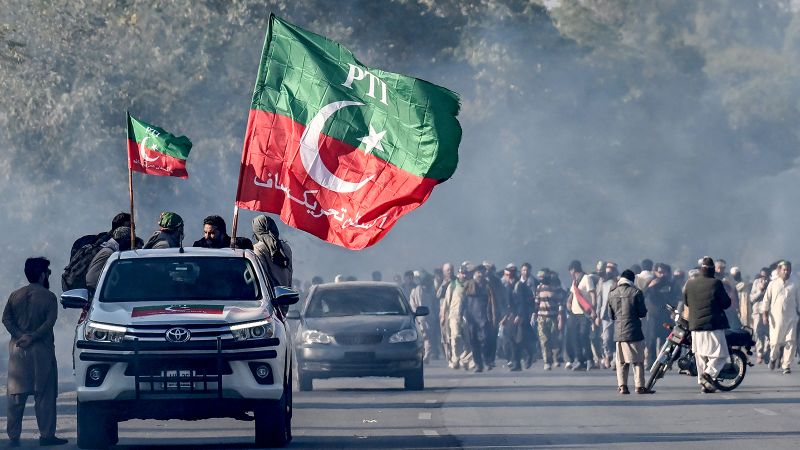 |
|
The Pakistani capital, Islamabad, experienced a significant security lockdown in late November 2023, triggered by widespread protests demanding the release of the imprisoned former Prime Minister, Imran Khan. Thousands of Khan's supporters, defying strict security measures including internet blackouts and road barricades, marched on Islamabad, culminating in clashes with security forces. The protests, organized as a “long march” originating in Peshawar, were met with a forceful response from authorities. Tear gas was deployed to disperse crowds, roads were blocked with shipping containers, and reports emerged of police vehicles being torched. The intensity of the conflict is underscored by reports of at least one police officer killed and several others, along with protesters, injured. The government, citing concerns about the stability of the country and security for a visiting foreign dignitary, deployed soldiers to key governmental buildings, including the parliament, the Supreme Court, and the Secretariat.
The government's response involved a multi-layered security strategy. A preemptive internet blackout aimed to hamper communication and organization amongst protesters. Major roads leading into Islamabad were barricaded, creating significant obstacles for the marchers. The Interior Minister, Mohsin Naqvi, issued strong warnings, threatening extreme measures, including the use of live fire and the deployment of the military, if protesters breached security perimeters and entered specific areas of the city. While the government claimed to show restraint, reports from the opposition party, Pakistan Tehreek-e-Insaf (PTI), alleged the use of excessive force and the targeting of peaceful protesters. The conflicting accounts, coupled with the internet shutdown, made independent verification of events extremely difficult. The government's actions underscore the high stakes involved and the perceived threat to national stability.
The motivations behind the protests are multi-faceted. Central to the demonstrations is the demand for Imran Khan's release from prison. Khan, a highly popular figure with a strong following, faces numerous criminal charges, which he and his party vehemently deny. His supporters perceive these charges as politically motivated, intended to silence opposition to the current government. Beyond Khan's release, protesters also object to a recent constitutional amendment that grants the government greater power in selecting judges for superior courts, particularly those who handle political cases. The PTI also alleges the February elections were rigged, claiming a “stolen mandate.” The ongoing tension between Khan's supporters and the current government, exacerbated by Khan's imprisonment, has heightened political instability in Pakistan. The protests come at a sensitive time for the country, which is also grappling with challenges from sectarian violence and separatist militant attacks. The situation highlights the deep political divisions within Pakistan and the significant challenges facing the government in maintaining order and stability.
The impact of these protests extends far beyond the immediate clashes in Islamabad. The security lockdown disrupted daily life in the capital and neighboring areas, with schools closed and public transport suspended. Thousands of arrests were made in provinces across the country, in an effort to prevent protestors from reaching Islamabad. The economic implications of the shutdown are also noteworthy, impacting businesses and potentially hindering trade and investment. The international community is closely watching the situation, concerned about the escalating tensions and the potential for further unrest. The events underscore the deep political polarization within Pakistan and the complex interplay between the military, the government, and political movements. The long-term consequences of this confrontation are uncertain, with the potential for continued unrest and heightened political instability unless a resolution is found that addresses the underlying concerns of Imran Khan’s supporters.
In analyzing the events, it's essential to consider multiple perspectives. While the government has presented its actions as necessary to maintain order and security, critics have condemned the heavy-handed approach, citing concerns about human rights and freedom of speech. The conflicting narratives highlight the information gap created by the internet blackout, making it challenging to obtain a complete and unbiased understanding of the events. Independent investigation and unbiased reporting will be crucial in determining the full extent of the violence and the accountability of all parties involved. The long-term implications of these protests remain to be seen, but they serve as a stark reminder of the precarious political landscape in Pakistan and the need for a peaceful resolution to address the underlying political tensions.
